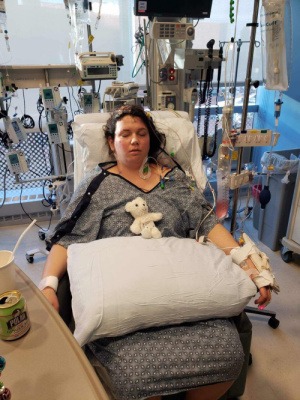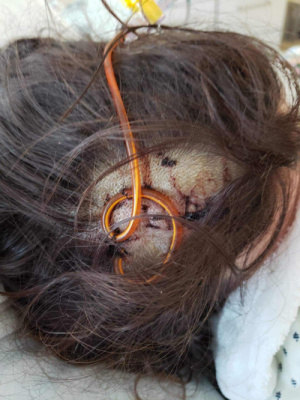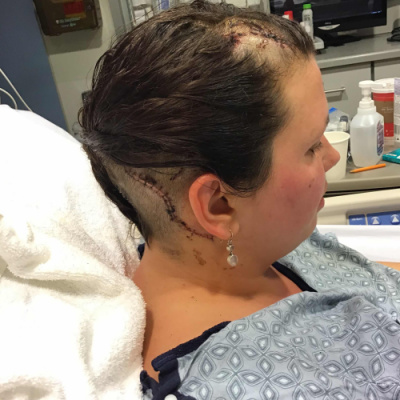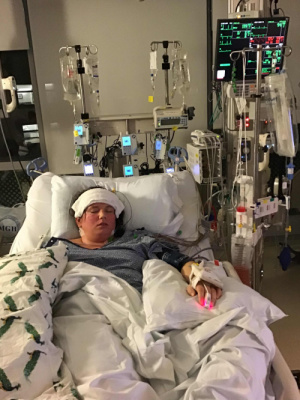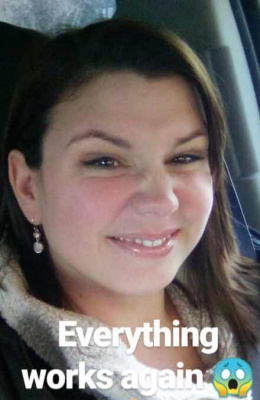Journal entry by Kayla Ingraham —
Hi everyone,
It has been a few months since I have updated, but I wanted to reach out and let everyone know that I am doing really well—better than I had expected to be at this point, that’s for sure. Having had brain surgery and a tumor still feels very surreal to me, and I am still sort of at a loss for words about all of it.
Anticipating, enduring, and recovering from brain surgery has been one of the most momentous experiences of my life. It has come with so many physical and mental challenges, but with also many rewards.
I was in the Neuro ICU for 8 days, and 7 of those days I had a gravity-fed drain coming out of my skull to allow for drainage and intracranial swelling. I woke up from surgery and immediately began vomiting from the atrocious taste of medical tubing and oxygen, from being intubated for so long, and was unable to open my eyes because I was seeing quadruple and was extremely dizzy (imagine seasick and the spins combined x100). I remember my throat was the sorest it’s ever been—it felt scratched and dry—and my bronchi were really congested, but I couldn’t cough to break anything up as the neck muscle and skull base pain was excruciating and I was too weak; it felt like someone had hit me in the back side of my head with a bat. Like with any surgery, I wasn’t able to eat or drink for at least 10 hours beforehand, so when I woke up after being intubated for 12 hours, all I wanted was cold water, or at least ice, especially since I felt the moisture would help break up the congestion that left me unable to speak. (I nearly completely lost my voice for 5 days and surgeons were concerned for a bit that it was nerve damage.) However, apparently I wasn’t allowed to drink or eat anything until a speech pathologist could come in the following day and observe my swallowing and vocal chords through a camera that went in through my nose (40hrs after my last real drink of water). I was so thirsty that I was asking the nurses to bring me cold washcloths for my forehead and I would ring them out into my mouth when they weren’t looking. I legit felt like Tom Hanks in Cast Away. (I was hydrated from IV fluids but thirst, I’ve learned, is a different animal.) On top of that, when I was finally allowed to drink, I learned I wasn’t allowed any water because my surgeon wanted to keep my sodium levels elevated (what?!). The next day, when I was instructed to try ice chips while they monitored my swallowing, it wasn’t long after everyone left the room and I overindulged them that my stomach tightened from the cold of the ice chips and, unable to even turn my head or even sit up, I began vomiting all over myself. The nurses had to completely strip me and bed-bathe me after I had to call twice for help because the first time no one could hear my voice on the call bell. I didn’t eat anything solid until day 6 and couldn’t even wipe myself after I peed until day 5 because I was too weak. One of the good things I remember upon waking up is smiling and feeling my grin rise as it normally would after Jesse immediately telling me surgeons got the entire tumor with no damage to my facial nerve. I remember welling up, being so thankful to be awake, and still me, on “the other side.” At 4 days post-op we noticed a minor facial droop and it wasn’t until day six my palsy really became pronounced. I was bummed but still really happy with how everything turned out. I just remember thinking that I felt like I had been hit by a bus, and now I looked like it too. The entire right side of my head just felt and looked so different—I couldn’t hear but had (and have) constant white noise tinnitus, my scalp was numb, and now my face was falling. Being deaf on my right side has been a harder adjustment that I anticipated, but I am getting there. The most frustrating thing is that it causes complete sensory overload sometimes because my good ear is trying to pick up more noises and compensate for my deaf one. Not the most comfortable thing with loud little kids. Sometimes I wear an ear plug in my good ear in public to decrease stimulation. I guess it’s given me the perfect excuse to ignore people I don’t want to talk to. 🤷🏻♀️
I began walking at 3 days post-op with a physical therapist and a walker around the corridor. The huddling neurosurgeon residents didn’t find my jokes too funny as I shuffled past them in the hall. Walking such a short distance was absolutely exhausting to my newly compensating brain. I couldn’t turn my head when I walked, or I’d fall over; although I was no longer seeing quadruple, my world still felt like I was on a rocking boat in rough seas.
My facial palsy mostly resolved at about 5wks post-op and while there is some residual weakness, very few people notice it now. Those 4ish weeks with severe palsy were basically torture. It progressively got worse for at least two weeks and then plateaued. I felt so depressed, it was like mentally walking through mud, waiting to see how much of it would rebound, if it did. I will never forget the look on my surgeon’s face when we realized I in fact did have palsy, albeit delayed onset. We were all disappointed. I was glad they felt that defeat with me. Experiencing near complete one-sided facial paralysis was really life changing (and terrifying) for me. That in and of itself illustrated so bluntly how many things are out of our control and how lucky we are to have our brains do so much work for us (that we daily take for granted). That said, I still did not want a daily reminder of that magnitude to make me be grateful for what I do have. Frankly, if it hadn’t resolved I would probably still be a depressed mess. It is admirable how some people take such a massive change in their appearance in stride, regardless of the circumstances (burns, amputations, palsy, etc.). I think I would’ve been a miserable heap, at least for a long while. That said, through this process I have also learned bluntly of my vanity. Sigh.
To try and get my footing and feel normal somewhat again post-op (after I was basically bedridden for 4 weeks), I began lightly exercising at the YMCA Branch in Blue Hill at around 5wks post-op. All I did was walk on a treadmill at a slow pace, while hooked up to the emergency clip, and stretched, as anything more than that would’ve resulted in me falling over from still being unable to keep my balance. (I also did some PT work throughout the first month, so I incorporated the exercises while I was walking.) After incorporating light intermittent jogging and then eventually making my way to the elliptical for more intensity for a few workouts (but still a lot of stability), I decided to push myself and attempted to run a full mile non-stop at 9 weeks post-op. It came as a total shock when I was able to do it comfortably and it was, at that point, the biggest milestone in my recovery. Feeling my feet move under me that way again has been really invigorating and has kind of catapulted me into really striving to see what I am capable of—without killing myself. Since then, I have run over 30 miles, respectively. The farthest I have achieved consecutively so far is 3.2 miles, which is my goal for an upcoming 5K. Never having been a runner, this is all super exciting and new to me, and a challenge nonetheless. Slow and steady! 🐢
One of the strangest things that has happened from surgery is that I now have exercise-induced vasomotor rhinitis — in other words, when my blood vessels expand from exercise and I start sweating, my nose begins to run profusely and my eye waters to the point of tears rolling down my cheek. So, I have to have a tissue with me constantly. It gets kind of annoying, but it is tolerable. I do get headaches pretty frequently, but blood flow and stretching seems to help them.
When I came home from the hospital, I was on EIGHT different medications, including an anti-fungal for the thrush caused by said medications. That was something I was totally unprepared for. Not driving for so long and being so isolated was really hard, as was/is adjusting to the amount of sleep I needed and still need. My record for sleep was 20 hours in one day, and my kids don’t totally understand why I am so tired. But we are adjusting, slowly but surely. Currently I basically can’t function without at least 9 (uninterrupted) hours.
So many people in the community have helped us: babysitting the kids, providing dinners, desserts, visits, rides for me, donations and fundraisers to help with travel and childcare costs, massages, Thinking of You cards, and more. I don’t think we could ever repay people for what they have done. I still feel very much inside my shell about it, just so grateful for everything.
I am also so grateful for those of you who have lent a curious mind and ear to me through this. Writing helped so much, especially during times when my mind was absolutely reeling with fear, and putting it down somewhere else outside of me, whether on CaringBridge or on a canvas with acrylic paint or in a rambling social media post, was the only thing that helped me sorta try to make sense of it. Writing is a bit more difficult and annoying now because I don’t have the same cognitive power and sharpness I had pre brain surgery; I think it will come back in time though. (This entry took me 5-6 writing sessions to finish.)
During the period where my palsy was at it’s worst and I was desperately looking for some sort of inspiration and understanding, I listed to an audiobook called When Breath Becomes Air, a memoir written by Paul Kalinithi, an upcoming neurosurgeon who, in his last year of residency, was diagnosed with terminal lung cancer at age 36. An excerpt from this book really eloquently sums up so much of what I have felt in these last 10 months:
“While all doctors treat diseases, neurosurgeons work in the crucible of identity. Every operation on the brain is by necessity a manipulation of the substance of ourselves, and every conversation with a patient undergoing brain surgery cannot help but confront this fact. In addition, to the family the brain surgery is usually the most traumatic life event they have ever faced, and as such, has the impact of any major life event. At those critical junctures, the question is not simply whether to live or die, but what kind of life is worth living. Would you trade your ability, or your mother’s, to talk, for a few extra months of mute life? The expansion of your visional blind spot for the small possibility of a fatal brain hemorrhage? Your right hand’s function to stop seizures? How much neurologic suffering would you let your child endure before saying death is preferable? Because our brain mediates our experience of the world, any neurosurgical problem forces a family and patient, ideally with a doctor as a guide, to answer this question: what makes life meaningful enough to go on living?”
The book was so touching that I bought it again as a hardcover and reread it. It jarred me into a place of sheer gratitude and admiration for what these humans (neurosurgeons in particular) are capable of doing in order to help others survive and go on with a meaningful life, including setting aside their own lives at times. Kalinithi’s description of the rigorous training, sleepless nights, years in school, etc., brought me to tears. Going back to Mass General for my post-op wasn’t scary, nor did it bring back bad memories; it was extremely emotional as I was reminded of the 30+ people team that took care of me to ensure my survival. I could never repay what they did for me. The standard of care there far exceeded any kind of care I’ve had anywhere. Every single thing was so meticulously tended to, and done so promptly. It holds deep sentiment with me, and at this point, Boston sorta feels like a second home.
While thankfully pathology showed the tumor was non-cancerous, there is no guarantee there will be no regrowth. (Side note: Friends, do not use the word “benign” lightly in any circumstance—these tumors, along with so many others, are not harmless.) I will have to have yearly MRIs for a while, then every two years, then every five years, and so on. So, while we are out of the woods for now, the tumor will be very much a part of my life forever.
Again thank you so much to all of you who have helped us before, during and after this ordeal. It has meant so much to all of us. I wish I knew better how to put how I feel into words, but maybe silence, gratitude and warmth in my heart will be the only answer I ever have.
Kayla
P.S.- I just went back and reread my post-op entries from Jesse and myself and realized I use many of the same references and stories. That cracks me up since I was completely out of it for about two weeks straight. There is a lot I remember, but a lot I have totally forgotten too 😂
-
Help Kayla Stay Connected to Family and Friends
A $25 donation to CaringBridge powers a site like Kayla's for two weeks. Will you make a gift to help ensure that this site stays online for them and for you?
Show Your Support
See the Ways to Help page to get even more involved.


